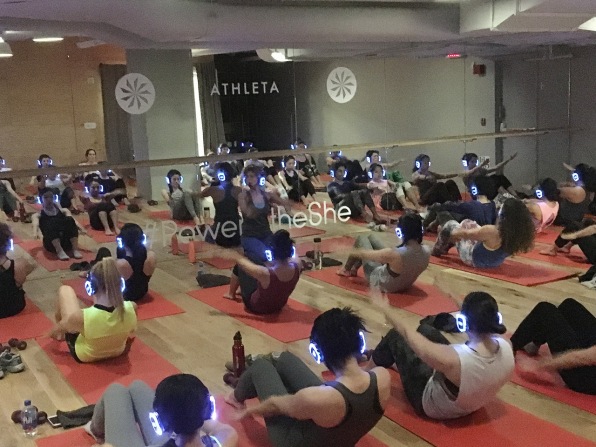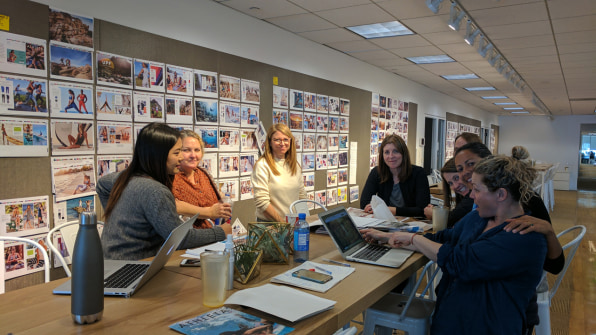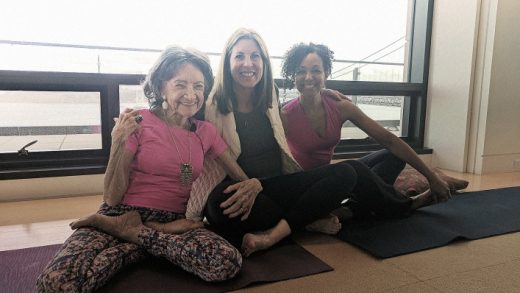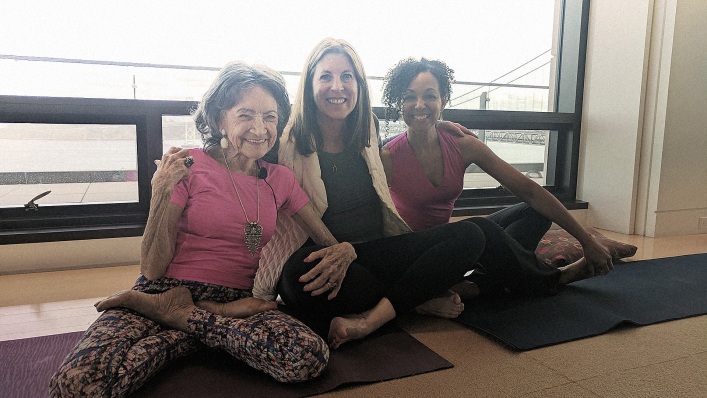Athleta’s CEO On Balancing Strength With Softness
This spring, when the women’s athletic lifestyle brand Athleta launched the next iteration of its “Power of She” campaign, the company included an ad featuring a 98-year-old yoga teacher, who says, “Anything is possible. Nothing is impossible,” as she strikes a yoga pose with a younger yogi.
Nancy Green, Athleta’s CEO, describes the campaign as a deliberate effort to “break the stereotypes of health and wellness, and what strength and beauty look like by showing much more body-type diversity and age diversity.” In doing so, Athleta, a division of Gap Inc. with 135 stores in the U.S., is joining the ranks of companies, like Dove and Always, that have been fighting how women are portrayed in advertising, “Women are not portrayed well in the fashion media. It causes serious body dysmorphia, psychological problems. I believe we can be a force for good in the world in changing that,” says Green.

Green points out the campaign is also about “supporting and empowering women,” and sharing the stories of nonprofits like I Am Water and Girl Ventures–that are helping women and girls build resilience and confidence. The response to the campaign has been overwhelming, “We’re getting thousands of comments and letters,” says Green. “We heard from a third-grade teacher, who said ‘I took your catalog to the class today, and we were talking about empowerment and bodies and self-imagery. The girls loved it.’” For Green, this is part of changing how a brand can matter in people’s lives. “I’m hoping that we’re going to influence the fashion industry through our success. Because beauty does not come in one size two.”
Working Mother
When Green joined Gap, Inc. in 1986, she was 25 and pregnant with her first child. “Nobody had kids back then at the company. I didn’t think I could do the job because I didn’t see other women that were doing the job as mothers,” she says.
There was one exception–a mother, who worked on the team, pushed Green to come back to work to realize her potential. She persuaded her to just give it a month. It worked, and Grene continued to grow at the company leading to her appointment as CEO of the Athleta brand four years ago, succeeding a series of male predecessors in the role and now leading a team that is 95% female.
Green, in turn, has made it her mission “to make sure I helped everybody I could to be successful at work and in being a mother.” As a manager, she encouraged women to have families but also come back to work and not give up their careers. “I made sure that we got our work done and we were all able to walk out the door when we needed to walk out the door.”
The company offers, Green says, offers a 5-month maternity policy, and makes sure to include planning for mothers to transition back to work. In many other ways, Green says she has tried to build a culture that actively supports families, “We understand that sometimes people need to work from home. We want moms to take kids to their doctor appointments. So we empower our managers to create the flexibility and support that our teams need.”
Green admits that working in a nearly all-female organization has perhaps made it easier to embrace this leadership approach, “It gives everyone an appreciation for the complexity of demands and fulfillment. Things can be complex when you blend family, business, and life.”

Balancing Strength With Softness
To help maintain authentic relationships and stay connected to her team, Green wanders the halls of their new headquarters in San Francisco when she has open time on her calendar. She will bump into people in their cafe and ask if she can join them for lunch.
The day prior to our interview, Green says she had one of these spontaneous lunches with a woman on her team who was about to go on maternity leave. Green checked in on how she was doing and the two talked about what having a child teaches you. And Green shared her own experience of how having her first child taught her about “endless love.” “You can never imagine loving anyone more than you possibly could when you have a child,” she says. But then her second child taught her about “infinite love” as she found that as endless as her love was for her first born it had not diminished her ability to love her second one.
Green says her approach to leadership is to constantly balance strength and power with softness: “I can be very demanding and I have extremely high standards, but I understand that people are human. I think it’s a combination of accepting that women can be strong and powerful and soft at the same time.”

From Headquarters to the Factory Floor
“If you go out to factories in Asia,” Green says, “most of the management is men and the factory workers, the sewers, the cutters are women.” In order to help fix this disparity, Athleta, as part of Gap Inc., has launched a new program to help grow women into management positions at its factories. More than 50,000 women in 12 countries have participated since the program was launched in 2007.
Earlier this year, Athleta also launched a new partnership with Fair Trade USA through which factory workers can earn an additional financial premium for the sale of Fair Trade Certified products. The workers vote and collectively decide on where to invest the money. “It could be anything from bicycles for transportation, childcare, or women’s health programs. The workers decide how they want to use the money. It’s a community fund.”
Connecting to Impact
Every Monday at Athleta, the company shares a feedback letter. “It’s always an extraordinary story about an impact we made that week on somebody’s life through an experience that they had in our store,” Green says.
I asked Green to share a recent story with me. “We have an employee in one of our Florida stores who is just returning from her second battle with cancer. I think it was her first week back on the job when a young girl came into the store, who was in a wheelchair, with her mom. Our employee asked if she could help lift her out of the wheelchair to try on some clothes. Here’s a woman who just returned from a double mastectomy and she is lifting a young teenage girl out of her wheelchair to help her try on some clothes. The letter was about how the mom felt. She had not had an experience like this before,” Green says, choking up as she tells the story. She reached out to the employee to say, “We are so fortunate to have you here . . . what you have done for this customer is unbelievable so thank you.”
It’s moments like these that help her stay inspired and connected to her purpose. “Sometimes you’re reading these letters and you’re just in tears because you just cannot believe you’re reading this. That reminds me of what we’re doing and why we’re doing it, and the care and nurturing that goes into it.”
Nancy Green wants the company to present a more realistic image of women in the media, and a more friendly workplace for its employees.
This spring, when the women’s athletic lifestyle brand Athleta launched the next iteration of its “Power of She” campaign, the company included an ad featuring a 98-year-old yoga teacher, who says, “Anything is possible. Nothing is impossible,” as she strikes a yoga pose with a younger yogi.
Fast Company , Read Full Story
(57)







